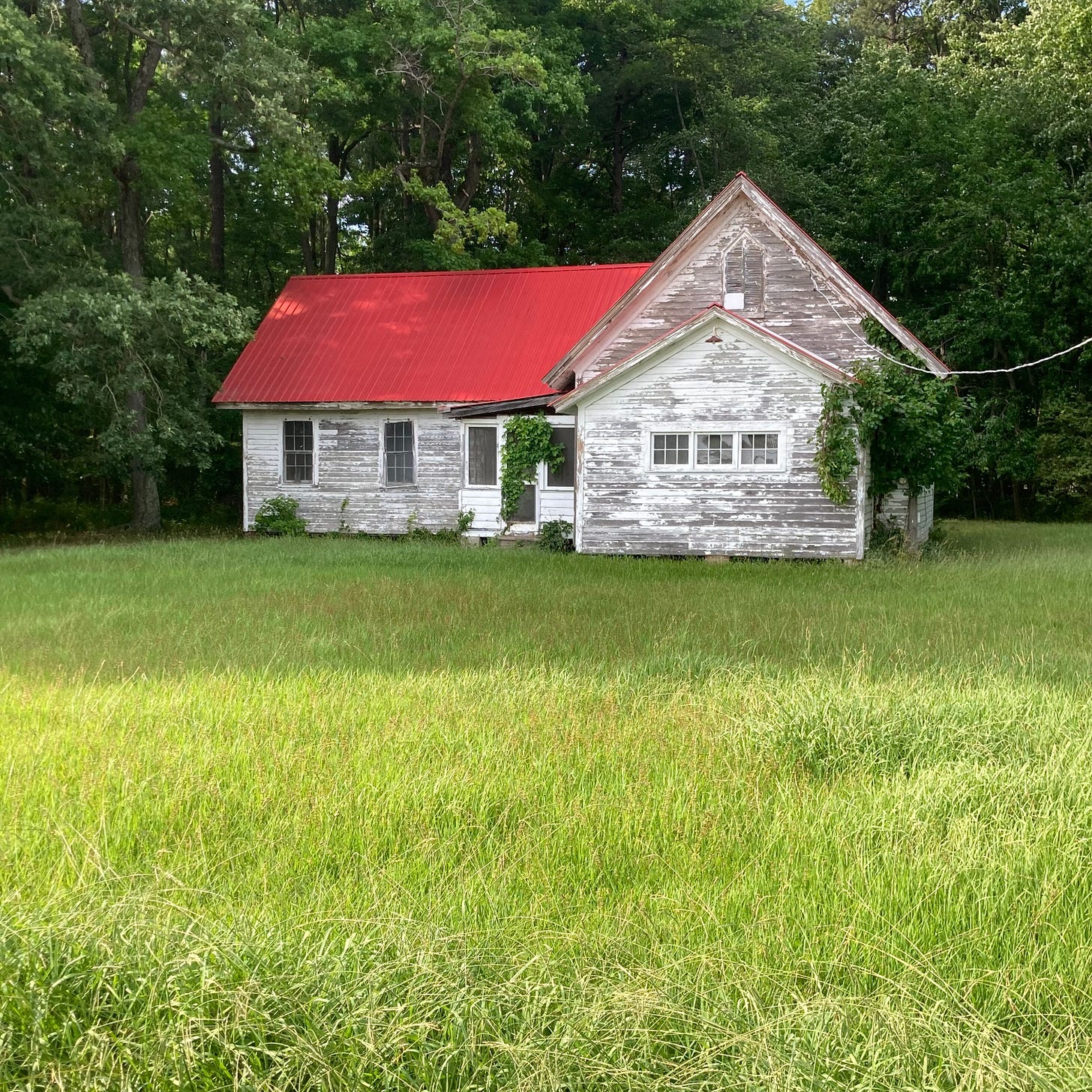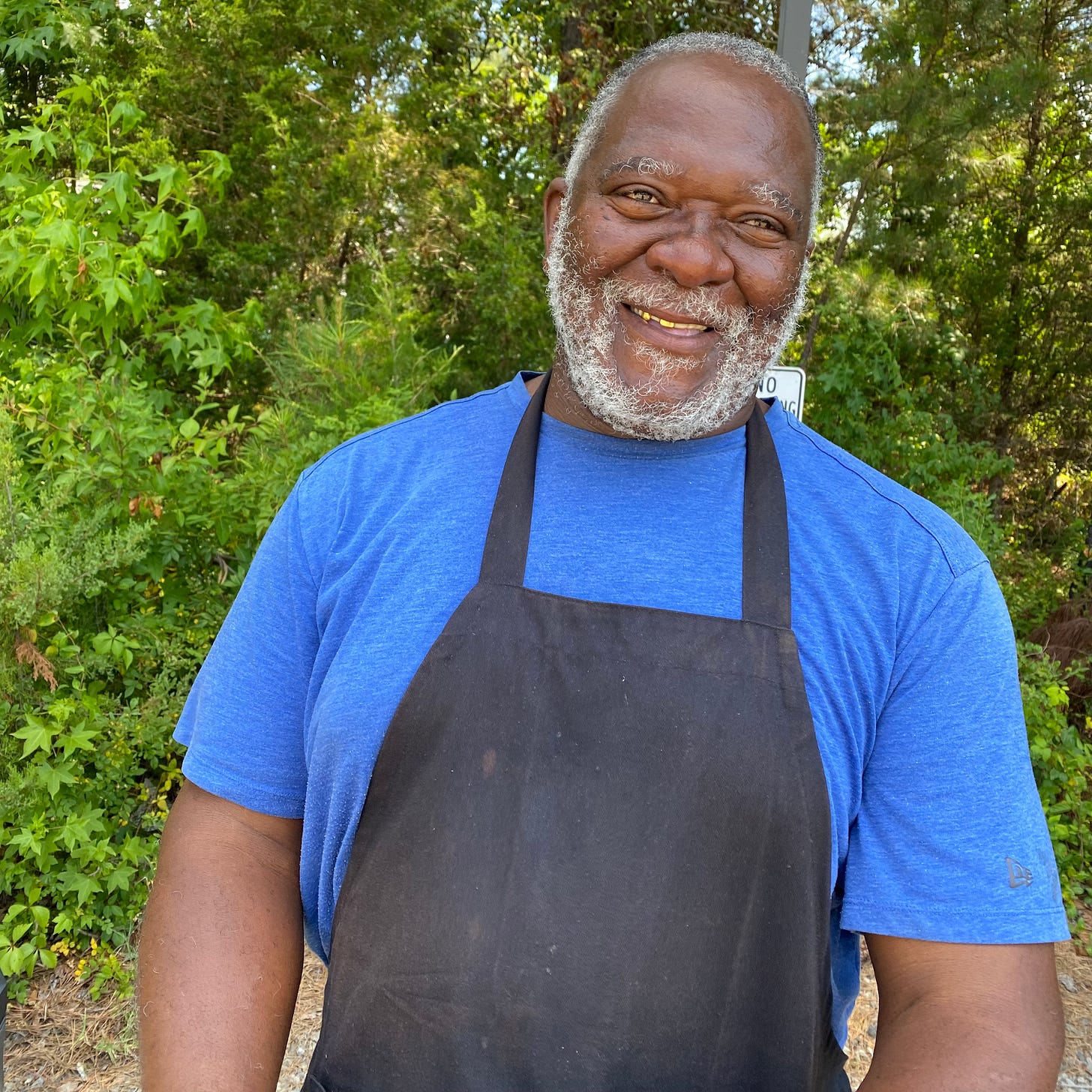People call him Chub. He spells it with one b. For reasons he’s never understood, others use two. At some point, he just let that go. His real name is Edgar. Edgar Leon Thomas, Jr., after his father, but he’s been Chub since he was small. To hear him tell it, though, he’s never really been small.
“I was a fat little baby,” he laughs. “That’s how the nickname got started. And now? Well, I’ve got a mean sweet tooth.”
Chub is unassuming but not shy, his voice deep, subdued, rounded. He’s 6’2” and, best I can tell, his heart is pure gold.
Though I can’t pin it precisely, I’d wager we’ve been crossing paths for 20 years. We met when he was part of a mowing crew that serviced the property where my family and I lived. Guys on high-speed machines buzzed around like antagonized hornets with little regard for my two youngsters, who were apt to zip across a patch of lawn nearby.
Chub was the only one who noticed, always making time to idle the mower long enough to offer a cheerful greeting, his gold teeth glinting out from a giant smile. Even now, when we see each other, the first thing he wants to know is how the girls are doing.
No matter the temperature—and our summers can be brutal—he wore a sweatshirt with the hood pulled over his head. I couldn’t fathom why he’d cocoon himself into such heavy clothes, and I remember feeling a little featherbrained when he explained, simply, that it kept the grass out of his ears. These days, a pair of noise-canceling headphones offers a cooler solution.
For a few years, during the mowing season, I saw Chub weekly. When we moved from the farm, I saw him only occasionally, but always with the same big grin and interest in how the kids were faring. The only predictable encounter was when I stopped to pick up barbecue.
Oh, the barbecue! Before I get to that, and it’s so very worth getting to, I want to tell you how Chub came to be part of this community. Like me and my husband, he didn’t start out here. Locals have another nickname for people like us. It doesn’t matter how long you’ve lived here, if you weren’t born here you’re a “come here.”
Chub came here from Reddick, Florida. His parents were seasonal workers for a gladiolus farm run by a man named Gus Schlag. They worked in the Sunshine State, and when the operation expanded, they traveled north to do the same thing in a new place. In the early spring of 1966, possibly during a stay in Wittman where the Maryland farm was based, Chub became a glimmer in his mama’s eye. He was born down south the following January and continued making trips back and forth with his parents throughout his childhood.
When he was 28, he relocated here for good, continuing to work for Mr. Schlag. Seven days a week, eight hours a day, for $5.15 an hour, he and others handled thousands of gladioluses destined for markets in Washington, D.C. and Baltimore. Every spring they prepared fields, planted bulbs, tended plants, and harvested flowers. Every fall they dug, cleaned and stored bulbs. They slept and ate in a former schoolhouse, often enjoying fresh vegetables and locally caught seafood. If they worked straight through for six months, without a day off, they were given a bonus.
Not too long after settling here, Chub met Pat. In fact, she made a point of meeting him, asking people she knew about the guy she’d seen across the street. He was 31. She was 44. He told her she was robbing the cradle.
He proposed, once, and she laughed him off, suggesting he’d had too much to drink. He never asked again. But over the years, he’s bought her five rings, at least one of which set him back a mighty pretty penny. As fate would have it, every one of those rings was lost, but the relationship has remained in place for 26 years. Her health isn’t what it used to be, on account of a battle with cancer, but they press on together.
Chub describes himself as a jack of all trades, master of none. Before the flower farm, he worked with horses, helping break as many as 400 mares a year. Later, he took up landscaping and handyman work. What he enjoys more than anything else is his food business: Chubbs’ Grilling on the Move.
He operates from a roadside setup that includes a large, mobile grill, a folding table, a pop-up tent, a few coolers, a camp chair, and a radio. Most weekends, locals and travelers can find him behind Carroll Motor Fuels, a small gas station and car wash on the south end of town. The only signage is a relatively new BBQ flag out front. This is not a business with an advertising budget. It relies entirely on word-of-mouth referrals and on Chub’s reputation for reliably flavorful food.
On weekend mornings, he arrives early to get the fire going, giving the heat time to moderate. When the coals are ready, he loads the cooker with seasoned half-chickens and racks of pork ribs. Instinct tells him when to turn them and when to take them off the grill. Pulled pork, from shoulder cuts cooked long and slow, is started the day before and either sold in containers or piled onto individual buns. No matter what meat is selected, two sauce options are offered on the side: a thick, sweet commercial type, and a thin, vinegar-based, homemade type. That’s the one I prefer.
This March, a tree fell on both his and Pat’s vehicles, hers just 10 days old. Chub had been hoping to buy an enclosed trailer to store his gear and offer him a place to get out of the wind in winter. Instead, he’s making payments on a new van.
“Both cars!” he repeated, shaking his head. “How does that even happen?” And then he laughed.
Chub works until all his goods have been sold, or until the selling feels done, whichever comes first. With advance notice, he fulfills orders for parties and events. Otherwise, it’s just a day’s worth of eats on the grill, rain or shine, Friday, Saturday and most Sundays. He gets especially busy right after church lets out.
He’s not a church goer himself. He had his fill of that in childhood. His grandmother was a minister, his mother a devout Baptist. He was in church every day, some days all day. Once, he asked why people who claim to be ‘saved’ seem like the first to ones to put down the less fortunate.
He sounds a little wistful as he recalls his mother’s answer. “Chub, a lot of people in the streets are going to heaven. And a lot of people in church aren’t.”
“For me,” he says, pointing to his barrel chest, “Church is in your heart. It’s how you treat others. I pray for everyone. Don’t matter who. My church is right here.”
He’s learned to keep his distance from people who make him angry. He considers himself lucky to have five true friends. Though his mother passed away in 2018, his father (nicknamed “Satch”) still lives nearby. He’s in touch with his remaining siblings. He keeps up with a daughter from a former relationship, and a niece who completed her college degree this spring, despite losing her grandmother (Chub’s mom), her mother (Chub’s sister), and her only brother as she made her way through school.
The last time Chub and I sat down to visit, I stayed nearly two hours. I bantered with people who came looking for grilled goodness: a woman disappointed she’d missed the pulled pork two times in a row; a man who manages the gas station and loves ketchup to the point of putting it on pizza; another man named Albert who caretakes on a property a few miles away, at the age of 94.
While we talked, Chub moved around his work station with ease, helping customers, telling stories. He strikes me as someone who knows exactly what he’s doing and how it needs to be done. He strikes me as a master of his craft.
When I finally stood to leave, I apologized for staying so long.
“Nah, it’s fine,” he said. “Sometimes it’s nice to hear something besides the birds and that radio.”
~Elizabeth












A lovely man with depth to his soul.
Chub will always be the kind of person the world needs - the ones we don't hear about enough. Stories about folk like these are the best kind because they gives us back our faith in human nature.
Wish I could taste his BBQ. This tangy story was the next best thing.